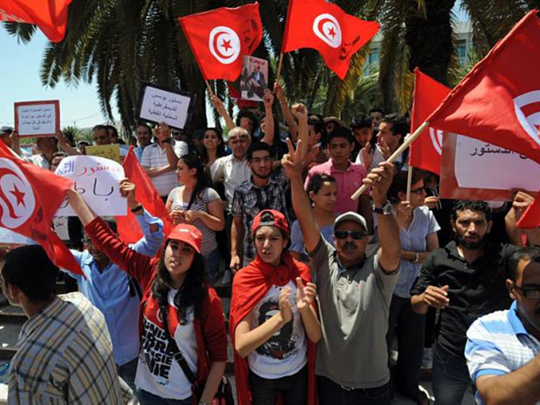
Amid the chaos of the latest Istanbul attack — which reeks of a false-flag operation — and the ongoing wars in Yemen, Iraq and Syria — even if we hardly mention the Mosul, Damascus, and Palmyra fronts — Tunisia stands as a ray of hope. Though the country is not out of the woods by any stretch of the imagination, recent public hearings of the “Truth and Dignity Commission” (TDC), which is the centrepiece of successive post-Jasmine Revolution governments, promise to change the rule of law for the better. Will Tunis succeed where others failed?
The Arab Uprisings started with the self-immolation of a Tunisian street vendor, whose death on January 4, 2011, led to mass protests, as ordinary Arabs shed their fears of autocratic rule. Four dictators fell while a fifth barely survives courtesy of fellow regional and international despots. As predicted by most observers, and six years hence, rivers of blood continue to flow throughout the region. Nonetheless, and to its credit, only Tunis managed to transition from authoritarian rule to elective government.
To be sure, Tunisia is not yet a beacon of democracy, but few should dismiss how the main Islamist party, Al Nahda, won elections and, far more important, how its leaders accepted a separation of powers between their religious and political activities. This is the immensely important success story that few acknowledge, though it is epochal in nature as well as substance because, and this must be stated as clearly as possible, we now have a genuinely Muslim democratic party that mimics its western counterparts where separation of powers, notwithstanding shortcomings, prevented chaos and provided for checks and balances. We can easily reject this transformation as Montesquieu warned in his 1748 masterpiece, The Spirit of the Laws, though nothing tops a tripartite system that separates political powers.
Of course, critics lament these initiatives and point to the several thousand Tunisians who are effective terrorists fighting in Syria, Iraq and elsewhere. They point to the December 21, 2016, Berlin market attack — where a Tunisian suspect killed 12 before he, in turn, was gunned down in a shootout in Italy a few days later — as an example of the ongoing chaos. Many now fear that the world is more likely to see similar calamities because the underlying reasons for revolt have not been addressed.
While such criticisms are fair, there is a whole lot more to the story, which must also be recognised. Truth be told, Tunis confronted a legacy of torture and intimidation, which defined its rule for decades and that certainly was no secret to western governments. In fact, the police state that the regime of ousted former president Zine Al Abidine Bin Ali created pretended to be vociferously secular, but targeted religious activists with a vengeance. It tortured young and old, men and women and concentrated on thinkers who threatened the dictatorship. It abused an entire nation as the overwhelming majority suffered. In short, and as the widely-watched TDC hearings broadcast live on primetime television illustrate, Tunisians violated every imaginable value.
Thankfully, the mere fact that a TDC saw light in 2014 is a major step forward and, despite persistent violence that recorded terrorist attacks on civilians, Tunisians continue to embrace democratisation with a vengeance. That is why the National Dialogue Quartet, composed of the General Labour Union, the Union of Industry, Trade and Handicrafts, the Human Rights League and the Order of Lawyers, and which worked to build a pluralistic democracy after 2011, was awarded the 2015 Nobel Peace Prize.
To be sure, the TDC hearings are genuinely painful to sit through, as victims describe in excruciating detail what befell them. Sadly, the process will be long, given that the commission received more than 62,000 charges so far. Each case must be fully investigated before witnesses can testify, with no guarantees that perpetrators will confront victims and be questioned by them, though this could change in the future.
The hearings, modelled after similar global commissions, offer financial compensation for the abused, though that is only part of its writ. Rather, the emphasis is on reconciliation and even if the government is not too keen to open old wounds, what the TDC is doing is to keep the current government in check.
That is, ultimately, the real test and while Tunisia is an Arab success story precisely because it avoids civil war and does not slop back into an even nastier autocracy, citizens must remain vigilant to prevent the return of old despotic habits. That can be achieved and the Tunisian TDC helps seal the process, but only with an independent judiciary. As Montesquieu specified: “The independence of the judiciary has to be real, and not apparent merely,” which Tunisians surely deserve.
Dr Joseph A. Kechichian is the author of the forthcoming The Attempt to Uproot Sunni Arab Influence: A Geo-Strategic Analysis of the Western, Israeli and Iranian Quest for Domination (Sussex: January 2017).










